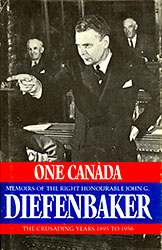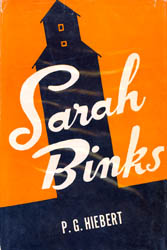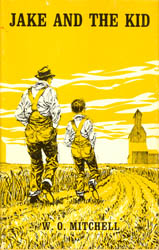Quoted excerpts:

By the summer of 1913, I was becoming too old to sell papers. It was impossible to find work in Saskatoon. My Uncle Ed got me a job as a farm labourer at twenty dollars a month, with forty dollars during the harvest months of August and September. Duncan Jamieson, my employer, lived some twenty miles south of Blaine Lake. Duncan was a bachelor and prepared our meals, invariable salt ham and potatoes. The work was hard but manageable, and I did every possible type of farm job. ...I didn't even enjoy an easy day when it rained; rainy days were set aside for hauling manure. The only respite I had was on Sundays when occasionally his sister-in law invited me to the adjoining farm to have a meal. One of those Sundays remains in my mind. The bank manager from a neighboring town and his wife were there for lunch. He gave dissertations on all current problems, and, as I thought I knew something about economics, I volunteered an opinion. His response was that I should mind my own business, that it was bad enough to have a farm labourer sitting at the family table, but to have him trying to express his view was totally inexcusable.
One Canada. Memoirs of the Right Honourable John G. Diefenbaker. Volume 1.
The Crusading Years 1895-1956. Toronto: Macmillan, 1975. pp. 75-76.
Sarah's greatest poem to Ole, ['her family's hired man'] is undoubtedly "Where Shall I Find". As in so many other of her greatest lines the spirit of the West breathes through and through it. Here she not only extols Ole's virtues as a man, but also pays splendid tribute to that manhood in a hired capacity. WHERE SHALL I FIND
WHERE SHALL I FIND
Where Shall I find a hired man
For homely destiny to toil,
To mend harnesses,
And shovel cement,
And boil oil.
Where shall I find a hired man,
To gather rocks and do the chores,
To harrow wide,
And plough deep,
The big outdoors.
Where shall I find a hired man
With a single passion for his job,
With thoughts of work,
And nothing else,
Within his knob.
Where shall I search for a hired man,
With corded arms and knotted knees,
With beamed shoulders,
And feet
Like Hercules.
Paul Hiebert. Sarah Binks. Toronto: McClelland and Stewart, 1964. p 39.
©1947
Excerpts from the fictional commendation of hired man Jake Trumper, as the Golden Jubilee Citizen of Crocus, SK as published in the Crocus Breeze.

Let us salute today the man who has seeded other people's grain when the summer fallow steamed under the spring sun, who has driven other men's teams when the meadow lark sang from the fence post. He has run other men's threshing machines and other men's binders. He has stoked other men's bundles against the far horizon. He has milked other men's cows, stretched other men's fences, done other men's chores.....
We venture to say that the bulk of our farm owners and operators today started out at some time in the past fifty years as hired men. If not as hired men than as boys who looked to the status of hired men as one of dignity, a place in farm life to be attained, a time to be reached when they could measure themselves against the worth of a grown hired man, a time when they could stook just as many stooks in a day as the hired man - a time when they could match him bundle for bundle when the threshing machine exhaled its slant plume of chaff and straw.
This man eats at the same table as his employer and his employer's family, enjoying a social equality unknown in other parts of the world and in some other parts of our own country. He is a hay-wire mechanic, veterinarian, stock man, who answers to the name of hardtail, sod-buster, stubble-jumper, hoozier, or john.
His genesis roves the world. He comes from Ontario, Galicia, Poland, Bohemia, Ukraine; he comes from south of the border, from Ireland, Wales, Scotland, Denmark, Norway, Sweden, Holland, Belgium. He wears flat-soled boots, has chores in his blood, straw in his overall bib and binder twine in his heart.
W.O. Mitchell. Jake and the Kid. Toronto: Macmillan, 1961. pp 182-183.

